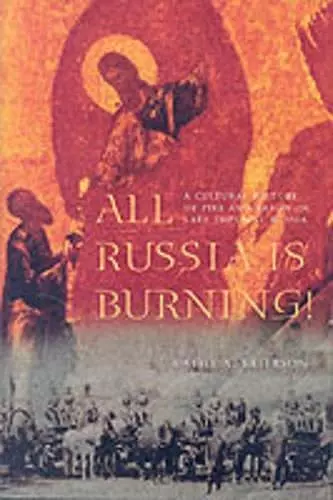All Russia Is Burning!
A Cultural History of Fire and Arson in Late Imperial Russia
Format:Paperback
Publisher:University of Washington Press
Published:1st Nov '02
Currently unavailable, and unfortunately no date known when it will be back
This paperback is available in another edition too:
- Hardback£91.00(9780295995878)

All Russia Is Burning! is a superb and pathbreaking study of fire in rural Russia in the late imperial period. The multiple ways in which Frierson addresses her topic make this book a landmark study of Russian society in the critical half century of reform and change before the shocks of the 20th century revolutions. All Russia Is Burning! is exciting, revealing, unique, and provocative. -- Jane Burbank, New York University An imaginative, first-rate piece of serious scholarship. Frierson demonstrates the profound importance of fire as a product of peasant culture and economy--long before it emerged as the 'red rooster' during the revolutionary years of the 20th century. -- Gregory Freeze, Brandeis University In this notable contribution to fire history, Frierson presents the first English-language survey entirely consumed with the history of fire in the years from 1860-1904. in doing so, she has illuminated the landscape of the history of rural Russia in its twilight years with an energy and force hitherto absent. -- Journal of Modern History, Journal of Modern History
Destroying almost 3 billion rubles' worth of property in European Russia between 1860 and 1904, accidental and arson fires acted as a brake on Russia's economic development. Using sources ranging from newspaper articles to statistical tables and court records, this work demonstrates the many meanings fire held for peasants and the educated elite.
Rural fires were an even more persistent scourge than famine in late imperial Russia, as Cathy Frierson shows in this first comprehensive study. Destroying almost three billion rubles' worth of property in European Russia between 1860 and 1904, accidental and arson fires acted as a brake on Russia's economic development while subjecting peasants to perennial shocks to their physical and emotional condition. The fire question captured the attention of educated, progressive Russians, who came to perceived it as a key obstacle to Russia's becoming a modern society in the European model.
Using sources ranging from literary representations and newspaper articles to statistical tables and court records, Frierson demonstrates the many meanings fire held for both peasants and the educated elite. To peasants, it was an essential source of light and warmth as well as a destructive force that regularly ignited their cramped villages of wooden, thatch-roofed huts. Absent the rule of law, they often used arson to gain justice or revenge, or to exert social control over those who would violate village norms. Frierson shows that the vast majority of arson cases in European Russia were not peasant-against-gentry acts of protest but peasant-against-peasant acts of "self-help" law or plain spite.
Both the state and individual progressives set out to resolve the fire question and to educate, cajole, or coerce the peasantry into the modern world. Fire insurance, building codes, "scientific" village layouts, and volunteer firefighting brigades reduced the average number of buildings consumed in each blaze, but none of these measures succeeded in curbing the number of fires each year.
More than anything else, this history of fire and arson in rural European Russia is a history of their cultural meanings in the late imperial campaign for modernity. Frierson shows the special associations of women with fire in rural life and in elite understanding of fire in the Russian countryside. Her study of the fire question demonstrates both peasant agency...
"This monumental study is the fruit of meticulous research in St. Petersburg central archives as well as Smolensk, Novogorod, and Vologda regional archives. Frierson examines not only educated society's perceptions of fire and of the peasantry it associated with village conflagrations but also fire's multiple realities. In doing so, she grapples with such fundamental issues as late imperial Russia's undergovernment, insufficient judicial system, economic backwardness, nascent civil society, misogyny, peasant culture, and interclass relationships. A must read for all historians of Russia and developing nations, this book persuasively argues that fire holds the key to explaining Russia's economic poverty in the modern era and illuminates the ways in which educated and barely literature members of Russian society were able to join forces to fight a scourge that repeatedly devastated the countryside's resources."
(American Historical Review)"The history of fire in Russia is such a splendid topic that one can only feel surprised that no one has previously attempted to write it. Cathy Frierson is to be congratulated not only for her inspired choice of theme but also for her accomplished execution of the task..A superb and innovative piece of scholarship."
(The Russian Review)"[Frierson's] wide-ranging and thoughtful analysis, with implications that extend into the realms of economic development, gender relations, and rural daily life, offers the reader an abundance of vivid evidence as well as thought-provoking conclusions."
(Slavic Review)"An excellent study which provides thought-provoking insights into post-Emancipation Russia through a fascinating analysis of the history of fire. The enthusiasm and interest Frierson shows toward her subject is reflected in the engaging writing style and the wide range of materials she uses to produce a multi-layered examination of an issue that affected all strata of Russian society. . . . While Frierson's focus on Russia is sharp and incisive, one is also able to see the country through an impressive theoretical and historical framework that provides a blueprint for new approaches to the study of Russian history."
(Slavic and East European JourISBN: 9780295982090
Dimensions: unknown
Weight: 454g
306 pages